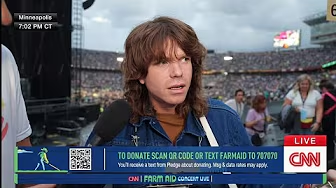John Berman: Bill, I know you have a special guest, someone who performed earlier in the day.
Bill Weir: That’s right, John. It’s rare to be scrolling through your feeds and find what you think may be the next Bob Dylan. Uh, that is definitely the case. I’m not singular in that observation. Many other people have had that, which is why Jesse Wells just played his first stadium. Uh, this talent out of Ozark, Arkansas. Good to meet you, Jesse.
Jesse Welles: Hey, good to meet you. Yeah.
Bill: You like the Dylan comparisons? What do you think of that
Jesse: Sure. All right. You know, that’s flattering. The shoes are too big to fill. But, you know, I think people just grab the closest thing they’ve ever seen to it and and uh that’s the comparison they draw.
Bill: Well, in addition to your music, which I love, and your voice I love, you are continuing this tradition of voices of conscience. You write songs about the war in Gaza and about United Healthcare. You wrote a song after the Charlie Cook assassination. It was very poignant. What is it that makes you lean in, while plenty of artists would rather avoid politics altotogether?
Jesse: Uh years things have gone down. I haven’t seen anyone really talk about it. Not to say that they’re not out there or whatever, but I just I myself hadn’t really seen it. It seemed like a vacuum there. And uh I woke up one day and reckoned, well I’d talk about it. Yeah. I got nothing to lose.
Bill: So that’s what is the what is generally the response? I imagine some people, like fans of folk music and protest bands through the years appreciate it. Do you get any push back? Do you get in these politically charged times?
Jesse: They might push back, I suppose. I don’t much look but the main point is to make a place for people to have a conversation about just what is the crux of the problem. That’s you’re kind of you’re fostering or facilitating a place for people to have a discussion with a tune.
Bill: You know, I could see faces lightening up as your lyrics landed in the daytime set earlier today. What is your writing process? Is it that you you absorb the news and it just comes out or can you talk about that?
Jesse: Oh, I just I’m just always writing. I’m just always writing. So, if I get a good rhyme, then that one will be a tune, you know. Yeah, sometimes the rhymes ain’t even that great, they still become tunes, you know.
Bill: Well, Bugs is a favorite with my 5-year-old son.
Jesse: Yeah, I like Bugs.
Bill: And I’m coming to Webster Hall to see you. So, congrats on your first stadium set. And this is the beginning of a long important career, I hope, for you.
Jesse: I appreciate that. I can’t wait to see you. Webster Hall will be a lot of fun. So, yeah.
Bill: I’ll see you there. Jesse Wells, everybody out of Ozark, Arkansas. Just one of an amazing— Look at this. There’s some real appreciation, across the demographics.
Jesse Welles Interview on CNN at FarmAid 2025

